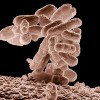Two potent images stayed with me long after the talk by J Glenn Morris, Jr., director of the Emerging Pathogens Institute at the University of Florida in Gainesville. He conjured up the first in presenting the opening stanza of Rudyard Kipling’s 1896 poem, “Cholera Camp,” which describes an adversary that easily overpowered the British infantry in India.
We’ve got the cholerer in camp – it’s worse than forty fights;
We’re dyin’ in the wilderness the same as Isrulites.
It’s before us, an’ be’ind us, an’ we cannot get away,
An’ the doctor’s just reported we’ve ten more to-day!
The second is a photo taken a century later at the cholera ward in the International Centre for Diarrhoeal Disease Research in Dhaka, Bangladesh. Just as powerfully, it depicts how the disease might be outlasted.
Women lie on their backs on cholera cots, each covered by a rubber sheet with a strategically placed hole. A plastic bucket beneath each hole catches the diarrhea that the patients effortlessly expel. Nurses, Morris said, use rulers to periodically measure each bucket’s contents. For every liter a patient loses, according to the rule of thumb, 1.5 liters must be replaced via intravenous catheter. The disease can kill quickly, if no one intervenes. But if started in time, the relatively simple re-hydration therapy can keep the patient alive until the infection burns itself out.
“I think you’ve probably got conflicting drives here. It is such a devastating disease that people recognize somebody’s dying, and they want to be there.”
At a talk to science journalists sponsored by the Council for the Advancement of Science Writing, Morris described an ancient disease that is easily spread through fecal contamination. For millennia, cholera has been endemic in Bengal, the densely populated region of South Asia that includes Bangladesh and India’s state of West Bengal. The disease is so closely tied to Bengali culture that villagers make offerings to Oladevi, the goddess of cholera, to appease her so she will spare villages from the dreaded disease.
At its peak, the bacterial killer can drain a liter of fluid from its victims every hour, mostly in the form of a watery diarrhea nicknamed “rice water stool.” A fully grown man can die in as little as 10 hours from circulatory collapse if not adequately re-hydrated, Morris said.
What could limit the spread of such a catastrophic illness?
Revulsion, perhaps. In her book Don’t Look, Don’t Touch, Don’t Eat, Val Curtis writes: “Disgust is a voice in our heads, the voice of our ancestors telling us to stay away from what might be bad for us.” Curtis, director of the Hygiene Centre at the London School of Hygiene and Tropical Medicine, lists cholera among the deadly gastroenteric infections harbored within feces. In the Western world, that list would surely include Clostridium difficile.
Aversion to poo, then, might ward off the dire consequences of a disease readily dispersed through contaminated diarrhea. But what happens when the person expelling liters of poo is a loved one—your child, parent, or partner? It’s an intriguing question, Morris tells me.
Transmission of the disease, he says, can occur within a household when a caregiver tends to a family member suffering from diarrhea full of Vibrio cholarae bacteria. “They’re passing huge numbers of microorganisms that are hyper-infectious, and then it becomes fairly easy to get enough on your hands, your fingers, in the food, in the water sources, then you then proceed to infect everybody else in the household,” he says.
Other members of the community may steer clear of the stricken household, but close relatives are less likely to abandon family members in need. “I think you’ve probably got conflicting drives here,” Morris says. “It is such a devastating disease that people recognize somebody’s dying, and they want to be there.”
In this case, he says, love can indeed trump disgust—particularly desperate or frantic love. “I think that applies to C. difficile. I think it applies to cholera, I think it applies to a lot of things.”
If disgust keep us safe, perhaps desperate love keeps us human.

RELATED STORY
Medicine’s Dirty Secret: Fecal Transplants Are the Next Big Thing in Health Care
This post originally appeared on Mosaic as “Desperate Love in a Time of Cholera” and is republished here under a Creative Commons license.




